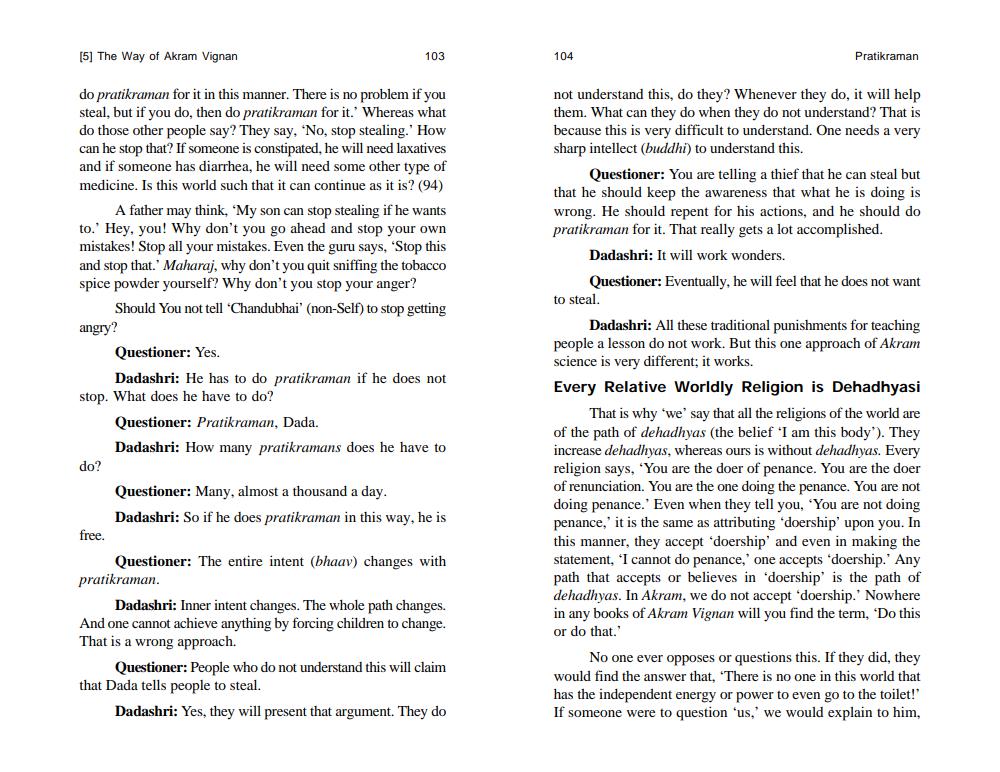________________
[5] The Way of Akram Vignan
103
104
Pratikraman
do pratikraman for it in this manner. There is no problem if you steal, but if you do, then do pratikraman for it. Whereas what do those other people say? They say, "No, stop stealing.' How can he stop that? If someone is constipated, he will need laxatives and if someone has diarrhea, he will need some other type of medicine. Is this world such that it can continue as it is? (94)
A father may think, 'My son can stop stealing if he wants to.' Hey, you! Why don't you go ahead and stop your own mistakes! Stop all your mistakes. Even the guru says, 'Stop this and stop that.' Maharaj, why don't you quit sniffing the tobacco spice powder yourself? Why don't you stop your anger?
Should you not tell 'Chandubhai' (non-Self) to stop getting angry?
Questioner: Yes.
Dadashri: He has to do pratikraman if he does not stop. What does he have to do?
Questioner: Pratikraman, Dada.
Dadashri: How many pratikramans does he have to do?
Questioner: Many, almost a thousand a day.
Dadashri: So if he does pratikraman in this way, he is free.
Questioner: The entire intent (bhaav) changes with pratikraman.
Dadashri: Inner intent changes. The whole path changes. And one cannot achieve anything by forcing children to change. That is a wrong approach.
Questioner: People who do not understand this will claim that Dada tells people to steal.
Dadashri: Yes, they will present that argument. They do
not understand this, do they? Whenever they do, it will help them. What can they do when they do not understand? That is because this is very difficult to understand. One needs a very sharp intellect (buddhi) to understand this.
Questioner: You are telling a thief that he can steal but that he should keep the awareness that what he is doing is wrong. He should repent for his actions, and he should do pratikraman for it. That really gets a lot accomplished.
Dadashri: It will work wonders
Questioner: Eventually, he will feel that he does not want to steal.
Dadashri: All these traditional punishments for teaching people a lesson do not work. But this one approach of Akram science is very different; it works. Every Relative Worldly Religion is Dehadhyasi
That is why we say that all the religions of the world are of the path of dehadhyas (the belief 'I am this body'). They increase dehadhyas, whereas ours is without dehadhyas. Every religion says, 'You are the doer of penance. You are the doer of renunciation. You are the one doing the penance. You are not doing penance.' Even when they tell you, 'You are not doing penance,' it is the same as attributing 'doership' upon you. In this manner, they accept 'doership' and even in making the statement, 'I cannot do penance,' one accepts 'doership.' Any path that accepts or believes in 'doership is the path of dehadhyas. In Akram, we do not accept 'doership.' Nowhere in any books of Akram Vignan will you find the term, 'Do this or do that.'
No one ever opposes or questions this. If they did, they would find the answer that, "There is no one in this world that has the independent energy or power to even go to the toilet!" If someone were to question 'us,' we would explain to him,




